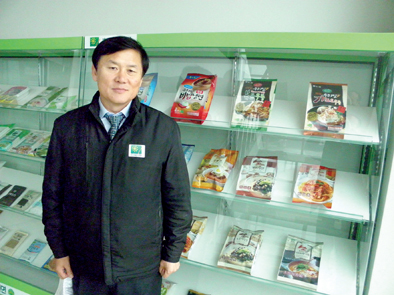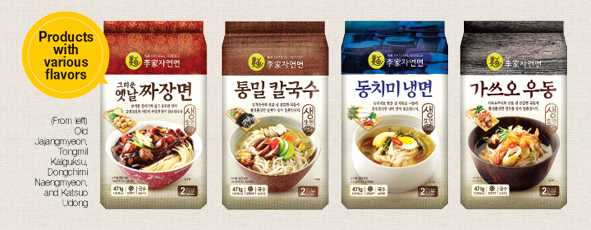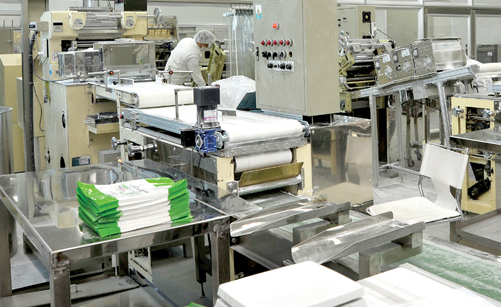| 제목 | Iga Natural Noodle Enters Overseas Market with Maturation Technologies | ||
|---|---|---|---|
| 작성일 | 2015.11.24 19:54 | ||
Iga Natural Noodle Enters Overseas Market with Maturation TechnologiesLong-term Favorite, Diverse NoodlesOne of the foods gourmets enjoy having is noodles. Although the names are different―janchi-guksu (banquet noodles), jajang-myeon (Chinese-style noodles in black soybean sauce), udon, pasta, ramen, naengmyeon (cold noodles), rice noodles, etc.―all these dishes are noodles. The cultures are different, too, but people around the world love noodles, so we can often have noodles from other countries in local restaurants. In the past, noodles were rare. They became popular as a food people can enjoy at a low price after flour started to be mass-produced. Then, food companies began developing and launching noodle products that could be cooked easily in a restaurant or at home. That is how noodles became a familiar food to modern people. In other words, the growth of the noodle business reflected the expansion of the instant food market. One good example of this process in Korea is Iga Natural Noodle, a company that has been cultivating its brand power based on noodles.
 Famous for Soft and Chewy Noodles
Iga Natural Noodle, established some 15 years ago, is famous for producing soft yet chewy noodles. The praise the company receives for the excellent taste of its noodles is owed to 20 years of noodle fermentation and maturation know-how. Iga Natural Noodle is producing and supplying its products to many food businesses through OEM (original equipment manufacturing). Their clients include famous Korean franchise companies Nolboo and Chaseondang.
Iga Natural Noodle produces a variety of noodles all of which can be cooked easily at home or in a restaurant. The main products are: Old Jajangmyeon, Tongmil Kalguksu (soup with fresh flat whole-wheat noodles), Dongchimi Naengmyeon (cold noodles in radish water kimchi), Katsuo Udong, Bokkeum Udon (fried udon) and Naengmyeon (cold noodles). The types of the noodles―fresh wet noodles, frozen noodles, and refrigerated noodles―are offered depending on the needs of the market segment. Generally, the products that contain sauce can be fully cooked within 15 minutes. Lee Beom-soo, CEO of Iga Natural Noodle, said, “My major study was the culture of starch bacteria. I worked at a noodle company as the chief researcher and studied the technology of noodle drying. Making dry noodles for naengmyeon, for example, is a very difficult task because the product should have a storage period of about a year.”
 Challenging the Overseas Market with Their Own Brand
Recently, Iga Natural Noodle started producing noodles under its own brand in order to advance abroad. The company is betting on its advantage of possessing the technology to make tasty noodles. One of the reasons it wants to enter foreign markets lies in the difficulty of securing the domestic market with its own brand. Its first target is China, where sales of instant foods are steadily increasing. Because the country is geographically close, Iga Natural Noodle is focusing on refrigerated noodles. In the US and Australia, Iga Natural Noodle is planning to sell its frozen noodles. The company uses a freezing technology that keeps the taste of the noodles intact for a long time. To cultivate the market in China, the company has created the brand name CI, which comes from the Chinese letter meaning noodles, “麵.”
According to Mr. Lee, for the past five years, Iga Natural Noodle has been exporting naengmyeon to Japan, and other types of noodles to China, through OEM (original equipment manufacturing). He added, “We have also exported our products to Europe and received a positive response.” The company has proven the reliability of its products by obtaining several international certificates. For example, Iga Natural Noodle acquired FSSC 22000, which is based on ISO 22000, PAS 220, and ISO TS 22003. It is the No. 1 international safety system certification for food and food containers. One characteristic feature of ISO 22000 is that it uses PAS 220, an established program for food suppliers, to maintain the food safety standards during the production process. PAS 220 includes 18 requirements including the arrangement of the workplace, disposal of waste, cleaning and maintenance of equipment, management of insect pests, personal hygiene, and so on.
 Opened the Korean Whole Wheat Noodle Restaurant Millac
To make its products, Iga Natural Noodle buys 400 tons of Korean wheat every year. The company is using the Korean wheat in order to help revitalize domestic wheat production. In fact, the Korean wheat, which is used for Urimil (in Korean “our wheat”) products, is about 2.5 times more expensive than the imported wheat. However, it is also very safe.
Last year, Iga Naural Noodle opened its first restaurant. Named Millac, it specializes in Korean whole-wheat noodles. Whole-wheat noodles are made with the flour containing the aleurone layer (the husk part of wheat). Whole wheat is good for modern people’s health because it is rich in nutrients such as dietary fibers, minerals, and vitamins. Korean wheat, unlike foreign types, is sown in the fall and harvested in the early summer, so it is safe because there is no need for insect pest control (pesticide treatment). Despite using the expensive whole-wheat noodles, Millac offers its dishes at the competitive price of KRW5,000-7,000. Mr. Lee explains, “The first thing that comes to our mind when we think of whole-wheat noodles is that they are tough. However Urimil whole-wheat noodle are pleasantly chewy and soft thanks to the long kneading and fermentation time. Armed with years of experience and knowhow, we are offering the products that modern people prefer. We will do our best to expand overseas with the Millac brand and open a Millac franchise enterprise abroad.”
출처 : Korea AgraFood April 2015 ( issue 235), 36~39page |
|||









